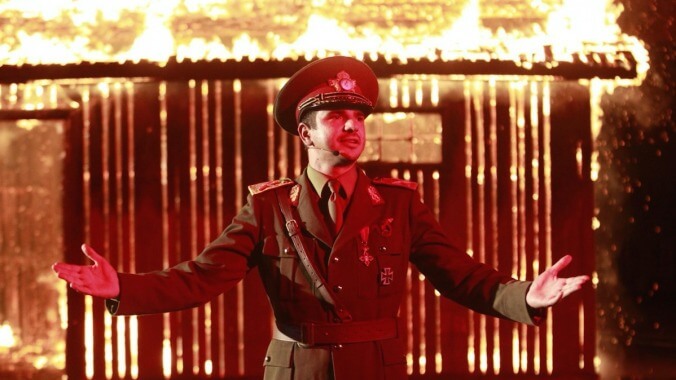How do we reckon with history? And to what extent do we bear its guilt? These questions, not uncommon in countries that have done Bad Things, trouble the work of the Romanian filmmaker Radu Jude. Aferim!, the first of his films to garner significant international attention, was a sort of darkly comic “Romanian Western” that followed an aging constable and his teenage son as they hunted for a runaway Romani slave on behalf of a vengeful boyar in Wallachia (one of the principalities that would eventually merge to create Romania) in the 1830s. It was a film loaded with historical ironies, not the least of which was the fact that the illiterate, credulously antisemitic lawman Constandin cut an almost modern figure when compared to the priests and nobles he and his boy encountered along the way.
Jude’s ambitious new film, the meta satire “I Do Not Care If We Go Down In History As Barbarians,” turns its attention to both the 1940s and the present—that is, to Romania’s role in the Holocaust under the military dictatorship of Ion Antonescu and to the subsequent whitewashing of the country’s wartime image. The Antonescu regime, under which the antisemitism that had flourished in Romanian society since the days of King Carol I finally turned to genocide, is a subject Jude has prodded at before, in his recent films Scarred Hearts and The Dead Nation. But Barbarians, with its jabs at what-aboutism and willful historical ignorance, represents his most direct and confrontational attempt at tackling what might be the central problem of his work: national identity. What does it mean to be “pro-Romanian” when the call of national independence—whether from Ottoman suzerainty or Soviet influence—has always seemed to go hand-in-hand with getting rid of the Jews?
As Raul Hilberg famously noted in his landmark history of the Holocaust, The Destruction Of The European Jews, “No country, besides Germany, was involved in massacres of Jews on such a scale.” But when the protagonist of Barbarians, a theater director named Mariana Marin (Ioana Iacob), brings up these words to Movilă (Alexandru Dabija), the local administrator who has taken it upon himself to talk her out of staging an ambitious reenactment of Romanian atrocities in a city square, he responds with a sardonic shrug. “We always come in second.” Not that his cynical devil’s advocate routine is the only hurdle in her way. The seniors who have come from a local community center to play the Jewish victims of the Odessa Massacre refuse to work with Romani people; the younger historical reenactors she has talked into helping with the production only want to play Nazis; the sound effects are all wrong. Mariana is also having an affair with a married airline pilot, though that arguably has less bearing on the final outcome.
There are moments of almost Guffman-esque comedy scattered throughout the film’s 140 minutes: auditions in which amateur thespians have to mime being burned alive or beg for their lives; costumes left over from a low-budget horror movie about Nazi zombies; an ambulance coming to pick up an actor who was shoved too hard during the climactic public performance. But the overall mood is one of disquietude. There are, statistically speaking, almost no Jews left in Romania, which was once home to the second-largest Jewish population in Central Europe. The actors playing them are gentiles. Everything is in quotation marks, from the title, which comes from a speech given by one of Antonescu’s deputies in 1941, to the character of Mariana herself; Iacob first appears addressing the camera out of character, explaining the differences and similarities between the role she is playing and her own background.
Barbarians is, in other words, anything but subtle. As in Aferim! (shot in black-and-white widescreen) and Scarred Hearts (in color Academy ratio), Jude’s choice of format is largely rhetorical: 16mm for most of the movie, local-news digital video for the big finale, both mimicking a documentary here-and-now that is also, to some extent, a distancing effect. One ends up wondering what exactly is real. Is the downpour that interrupts Mariana’s argument with the re-enactors, with a brass band rehearsing in the background, fake? What about the crowd that gathers to watch the performance, clapping at the antisemitic speeches and booing the arrival of the Soviet troops? There are times, however, when the film’s approach comes across as smugly collegiate, the long-take dialectics devolving into shouted volleys of names and quotations: Arendt! Wittgenstein! The Vienna Actionists! Schindler’s List! “The map is not the territory!” “The first time as tragedy, the second time as farce!”
Yet one would probably be mistaken to think of Mariana as a pure director stand-in, or the film as one overripe argument between Jude and his straw men, of which the bureaucrat Movilă is merely the most persistent and well-read. Like the old-timers and peasants of Aferim!, the characters of Barbarians exist in a world of sayings and proverbs—theory and factoid as the new folk wisdom—that leave them unprepared for a pessimistic conclusion. At its core, Barbarians is about the failure of communication. (The subplot about Mariana’s affair is more important than it seems.) This places it into a long tradition of modernist responses to fascism that stretches back to Eugène Ionesco—though one still can’t shake the feeling that Jude is more interested in pointing out obvious ironies than in anything else.












![Rob Reiner's son booked for murder amid homicide investigation [Updated]](https://img.pastemagazine.com/wp-content/avuploads/2025/12/15131025/MixCollage-15-Dec-2025-01-10-PM-9121.jpg)

























![HBO teases new Euphoria, Larry David, and much more in 2026 sizzle reel [Updated]](https://img.pastemagazine.com/wp-content/avuploads/2025/12/12100344/MixCollage-12-Dec-2025-09-56-AM-9137.jpg)



